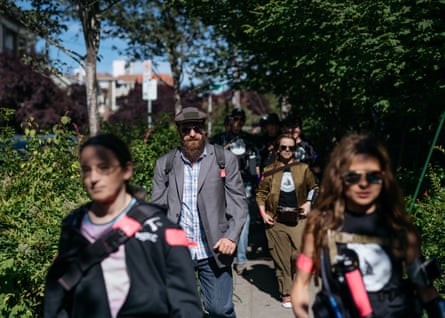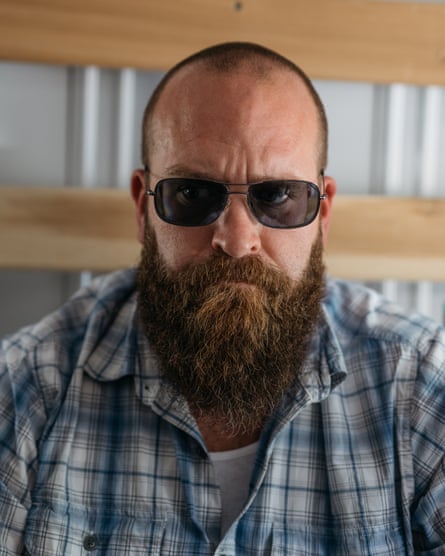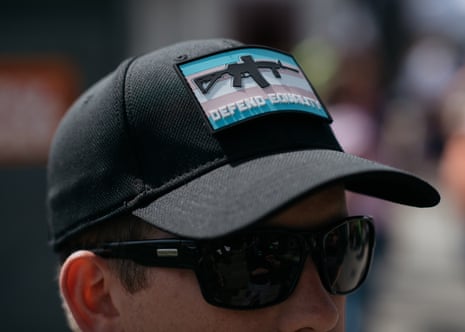The van lumbered down one of Seattle’s many steep hills. A half dozen people packed inside but despite the heat, most wore long pants and boots, and several sported black hoodies. The atmosphere was subdued, except for the occasional joke. It wasn’t so much tension as seriousness – there was work to be done.
The people in the van are members of the Puget Sound John Brown Gun Club (PSJBGC). Their stated aim is to fight white supremacy and build community defense in America’s Pacific north-west, and their presence has become a fixture of protests in the Seattle and Tacoma areas, where the group is often invited to provide security against rightwing aggression.
The night before, several of them had been called to a library in nearby Renton, Washington, where a Drag Story Time Hour, an event series in which a local drag queen or drag king reads to children in a library or bookstore, was being disrupted by rightwing protesters. The protesters, who opposed the event as “immoral”, held up signs equating drag with pedophilia, and screamed “Shame! Shame!” at parents and their kids. Among them were members of the Proud Boys, a violent rightwing street gang, and Three Percenters militia, who were open-carrying firearms.
The north-west has been at the center of tense political clashes over the last two years. The area is an adopted home base for far-right groups like Patriot Prayer, Identity Evropa/American Identity Movement and the Proud Boys, who have organized numerous marches that have ended in violence. In response, a range of leftist groups have organized self defence groups and, in doing so, present gun ownership as a way to protect themselves and others.
Now, the Puget Sound John Brown Gun Club was en route to Seattle’s Trans Pride March.
In the weeks prior, word spread that a number of white supremacist groups had planned to disrupt the celebration. Hearing this, the club reached out to the organizers of the event, the Gender Justice League, and offered to assist with security or to provide escorts.
Brooke Wylie, the head of security for the Gender Justice League in charge of overseeing the 101-person security detail for the event, did some research on the club. She told them the event had a policy of having no open carry (that is, no visible weapon), which they were fine with. She accepted their offer. Police were also present, but many marginalized groups do not trust them to provide protection at public events, especially when far-right groups are involved.
Each member showed up with a concealed handgun. “We do our actions proportional to the threat, so when other people are out with rifles, we’ll be out with rifles,” Nick, the group’s de facto spokesperson, explained. “In this case, we don’t want to appear threatening for the people that we’re trying to protect and support; we want this to be a happy atmosphere, especially for a population that may have faced gun violence on the street just for being who they are.”
This scenario – in which armed community groups are working together to patrol a Pride event and protect it from other malicious and potentially armed groups – is becoming more and more common. There are more guns than people in America – approximately 393 million in a country of 328 million people. An average of 34,501 people died each year from firearms; in 2018, 992 of those deaths were the result of police shootings.
And the memory of the Pulse nightclub shooting in 2016, when 49 people were killed at a mass shooting at a gay nightclub in Florida, is still hanging heavily over the LGBTQ community.

Throughout the day, Puget Sound members stood watch oversections of the park, staying connected via walkie-talkies. “Thank you for being here!” was a common refrain from march-goers, as were inquiries on how to join (the group has a several-month long vetting process and probationary period for prospective recruits.)
Unlike some of the other masked antifascist groups at the march that day, the Puget Sound John Brown Gun Club consider themselves to be an “aboveground” organization, and choose not to cover their faces.
“Part of the reason we don’t cover our faces is that we don’t want to present as though we are a militia,” Fozz, a longtime member, explained. “We are not. We want to build relationships with people in our community, we want to appear approachable.”
While the group has not used deadly force, a former member of the group, Willem Van Spronsen, recently made headlines when he was killed by police after trying to set fire to Ice vehicles in a parking lot outside the Northwest Detention Center In Tacoma, Washington, a private immigration detainment facility.

‘You don’t want to be the antifa cop’
Gun control advocates are quick to point out that more guns often means more violence, no matter the intent behind them. A recent Stanford University study challenged the longstanding conservative view that more guns equals less crime, finding that states that adopted “right-to-carry” laws (which legalized concealed carry) saw a 13% increase in violent crime over 10 years.
Washington state’s relatively loose gun laws mean that even those with minimal training are able to show up to public events armed, which has potentially lethal implications. At a Milo Yiannopoulos rally at the University of Washington in 2017, an antifascist protester was shot in the stomach by a Trump supporter named Elizabeth Hokoana, who then claimed self-defense; if convicted, she faces up to 15 years in prison.
This is the context in which an armed community defense group has been invited to protect a trans pride event. The thinking goes that, since there are already guns everywhere, and the people who want to hurt minority groups are often heavily armed, their side may as well have guns, too.
When asked about how they would react if a survivor of gun violence came up and confronted them about their decision to bring guns into a public protest space, the Puget Sound Club members say that they would approach the situation with empathy. A member named Seraphiad pointed to their own history with gun violence as a starting point.
“The reason some people decide to carry is because they too have been victims of gun violence and other forms of violence,” they explained. “I would relate to them based on my own experience with violence and share my choice to protect myself.”
For many other left-leaning organizations, guns remain a difficult topic. The second amendment has attained almost religious significance to some conservative gun owners, while gun control has become a defining issue for centrists and liberals, the opinions of those on the more radical left vary. The Democratic Socialists of America, for example, responded to an interview request for this piece by saying, “the DSA has no comment on gun controls or the second amendment. Our members represent a diversity of viewpoints on this topic.”
Others have been more forthcoming. Patrick Blanchfield, the author of a forthcoming book on guns and the left called Gunpower, doesn’t specifically oppose the idea of armed self-defense, but he sees it as a potential danger to both the individual as well as a broader group or community, referencing the government’s brutal assaults on the Black Panthers as a historical example.
Blanchfield also sees an issue in the way armed groups have the potential to inadvertently replicate existing oppressive structures. “You don’t want to be the antifa cop,” he explains. “For example, I would need some convincing that armed leftists didn’t shoot partners at a rate substantially lower than non-leftists.”
‘There were swastikas in my kid’s park’
The Puget Sound chapter is part of a long American leftist tradition of armed groups, from the Black Panthers to current groups like Redneck Revolt, the Socialist Rifle Association, Trigger Warning Queer & Trans Gun Club, and the Los Angeles Black Coyote Collective.
Twenty-one members turned up that day. Nick, Fozz and a member who goes by Reverend were joined by Cat, a diminutive, self-described “soccer mom”; quiet, serious Vixen, with strawberry blonde hair and orange knee socks; Duke, the group’s stocky, bearded founder; and Shannon, a civil rights attorney and constitutional law professor.

There are plenty of anarchists among their ranks, but there are also people like Shannon who feel strongly about the second amendment and who are more interested in working within existing frameworks than tearing them down.
“There’s power in knowledge of the constitution,” she explains. “It’s OK to be a knowledgeable person whose politics are left of center, and be willing to understand and fight back within the legal framework.”
Duke, a lifelong anarchist who founded the Seattle chapter in 2017, describes himself as having retired from activism following the birth of his son in 2012. He did “normal progressive Seattle dad” things like taking his family to Black Lives Matter and Fight for 15 rallies until 2017, when he was inspired to act following the election of Donald Trump – and more specifically, by the proliferation of hate crimes that plagued Seattle during its lead-up.
According to the Seattle Times, hate crimes increased in Washington by 32% between 2016 and 2017, and Duke, who is Jewish, had a front-row seat.
“I really got active in John Brown Gun Club because there were swastikas in my kid’s park,” he says. “I knew a lot of people at that point who were organizing with Redneck Revolt across the country, so I was like, this is something I can do. So I formed this chapter, and members started flocking to us.”
The rise of white supremacist violence since 2016 served as a flashpoint for many members’ decisions to arm themselves. Fozz, who is Jewish, told a story about sitting down with his wife after Trump’s election and deciding which of them was going to learn how to use a gun, “because we’re going to need it.”
For others, it was the shock of violence at the fatal 2017 Unite the Right rally in Charlottesville that sparked their interest in armed self-defense.

“After Charlottesville, there was this recognition that there has to be somebody who’s not on the right who is willing to be in places that law enforcement either isn’t willing to be, or where law enforcement is supporting fascists,” Shannon explains. “When you see law enforcement escorting Nazi groups to parades [in places like DC or Detroit] you realize there’s a space to be filled by people who are confident in their skill as gun owners but whose bigger mission is community defense and protection.”
For Vixen, the decision to join came from the threats rightwing extremism poses to her identity. A trans woman who grew up shooting guns off her front porch in Indiana, she spoke about the toxic culture she had encountered at many gun ranges, and of the obligation she felt to protect her queer community.
“Today, I’m a trans woman at Trans Pride, so I feel like I’m personally able to step in front and put myself in front of people who are being attacked or harassed and just try to de-escalate the situation – which is always the goal,” she said. “Obviously, you don’t ever want to celebrate having to use force on someone, but completely throwing it away as an option is really self-defeating.”
So far, none of the members have had to use their weapons in this context, and the hope expressed is that they never will.
The day after the march, Cat, Nick, Duke, Reverend and Fozz gathered at a coffee shop to debrief. The club views gun control through a specifically leftist political lens. As Duke sees it, the root cause of American violence isn’t the guns themselves; it’s inequality.
“It comes out of not wanting to arm former slaves and people in poverty who are struggling and organizing, and so when we talk about gun control in America, what we really should be talking about is capital control. If you read the Dred Scott decision, there’s a line in there that says ‘We don’t want to grant citizenship because Black people might get guns,’ and I think that says an awful lot about America and gun control.”
White privilege is something that is repeatedly brought up throughout the weekend (while there are people of color in the organization, the membership is majority white). Shannon says that, due to her “middle-aged white lady veneer,” she knows she will be treated differently by police when she open carries at a protest.
In a recent appearance on W Kamau Bell’s United Shades of America, a documentary series for CNN in which he travels America to explore race-based subcultures, Duke and several other members sat down with the comedian and Black Lives Matter co-founder Alicia Garza to talk guns and race; the episode was shown on CNN, and netted the group a significant amount of attention – some positive, some less so from the rightwing trolls who targeted them on social media. It was a reminder, they say, that public exposure brings risks. Members face serious potential repercussions in both their personal and professional lives, as well as constant threats from rightwing extremists.
Fozz, a union organizer by trade, has been on suspension for the past four months after his involvement with the PSJBCG during his off hours was made the subject of an investigation at work. His supervisors identified a photo of him open-carrying at a protest; according to Fozz, the suspension was framed as a workplace safety issue because his bosses believe that he is capable of violence.
“It’s very disappointing as well as deeply concerning that an organization like a labor union would actually be critical of someone that takes the time and resources and expenses to stand up to people that would attack its membership,” he says. “I asked them the question, why do you guys have such a problem with a Jew standing up to neo-Nazis that are threatening his neighborhood?”
That weekend, none of the Proud Boys or other fascist provocateurs did show up to Trans Pride. For now, the Puget Sound John Brown Gun Club was off the clock.
